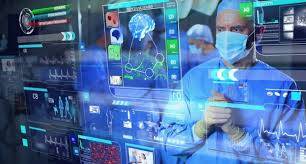Revolutionizing Healthcare: Breakthroughs in Technology That Are Transforming the Industry
In recent years, healthcare technology has undergone a significant transformation, leading to groundbreaking innovations that promise to revolutionize patient care. These technological advancements are not only enhancing the quality of care but also making it more accessible, efficient, and personalized. From artificial intelligence (AI) to robotic surgeries and telemedicine, healthcare is experiencing a digital revolution that is improving outcomes and saving lives.
One of the most notable breakthroughs is the integration of **artificial intelligence (AI)** into diagnostics and treatment plans. AI systems are now capable of analyzing vast amounts of medical data, enabling faster and more accurate diagnoses. For instance, AI algorithms can detect patterns in imaging scans, helping doctors identify diseases like cancer at earlier stages, when treatment is most effective. AI is also enhancing personalized medicine, where treatment plans are tailored to the genetic makeup of individuals, ensuring more targeted therapies.
Another significant innovation is the rise of **robotic surgery**. Robots are now being used in surgeries to enhance precision, minimize human error, and reduce recovery times for patients. Robotic systems like the da Vinci Surgical System allow surgeons to perform minimally invasive procedures with greater control, leading to smaller incisions, less blood loss, and quicker healing. This advancement is changing the landscape of surgery and improving patient outcomes.
**Telemedicine** has also experienced rapid growth, particularly following the global pandemic. Patients can now consult with healthcare professionals remotely, reducing the need for in-person visits. This not only improves access to care for those in remote areas but also streamlines the healthcare system by reducing the strain on physical facilities. Telemedicine is especially beneficial for mental health services, where virtual appointments offer convenience and anonymity.
In addition, **wearable health technology** is gaining traction, with devices like smartwatches and fitness trackers that monitor vital signs such as heart rate, blood pressure, and oxygen levels. These devices can alert users to potential health issues before they become serious, enabling early intervention and better management of chronic conditions.
Finally, **gene editing technologies**, such as CRISPR, are paving the way for groundbreaking treatments in genetic disorders. With the ability to alter DNA sequences, scientists are exploring potential cures for diseases that were once deemed incurable.
The future of healthcare looks promising as technology continues to evolve. These breakthroughs not only improve patient care but also offer new hope for better health outcomes across the globe. As these innovations become more widespread, the way we approach healthcare will continue to be reshaped, making it more efficient, accessible, and effective.



No comments yet
Be the first to share your thoughts!